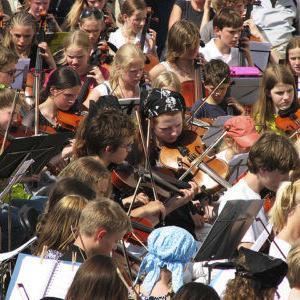Music is a universal phenomenon; it forms part of our everyday life, just as it is part of our inherited culture. As common and widespread as music is, we often miss the huge benefits music offers not to us, but to our children.
Our children are like our crown jewels, what they do and reflect either make us proud or want to do more by improving on them. Music is a good way to help our children make us proud and it also offers us the opportunity to do more for them.
Music stimulates children’s learning
Research upon research has shown that music benefits the brain, and playing a musical instrument benefits the brain even more.
Science has proved that the more a child plays a musical instrument the more their brains begin to hear and process sounds that they could not hear before. This enhances “neurological distinctions” between some sounds that can aid in literacy. This ultimately translates into improved academic results for children.
Some relevant studies have shown that music stimulates children brains in no small way and this in return improves their cognitive abilities.
Here are some studies to buttress this point:
According to a Neurological Research, 1997 Studies shows that Piano students more willingly comprehend mathematical and scientific concepts. Children performed 34 percent higher on test measuring proportional reasoning, like ratios, proportions, fractions and thinking in space and time, because they had received piano training.
The National Educational Longitudinal Study of 1988 First Follow-Up, U.S. Department of Education reveals that music students have received more academic awards that non-music students. It also indicates that music student have more of grade A and B compared to non-music students.
Studies have revealed that music lessons for children, helps sharpen their minds more during senility. One of those studies is that of researcher Brenda Hanna-Pladdy, a neurologist at the Emory University School of Medicine, reports that; “Musical activity throughout life may serve as a challenging cognitive exercise, making your brain fitter and more capable of accommodating the challenges of ageing. Since studying an instrument requires years of practice and learning, it may create alternate connections in the brain that could compensate for cognitive declines as we get older.”
The Comparative Academic Abilities of Students in Education and in Other Areas of a Multi-focus University Peter H. Wood, ERIC Document No. ED327480; The Case for Music in Schools, Phi Delta Kappan, 1994) observed that more music students are admitted into medical school after application, than other majors like math, English, biology, and chemistry.
Aside from these studies and observation there are numerous benefits that music offers to children:

Music promotes team work in children
Music assist children develop their teamwork skills and discipline. A child in an orchestra choir learns that for the choir to succeed all of them must work together irrespective of their differences. Discipline is enhanced when children commit to practice, rehearsal and learning music all, for the singular goal of the performance.
Music gives your child a sense of security
Sense of security, can also indicate confidence, something to hold on to that belongs to them alone. Music builds confidence in children; by learning to play a musical instrument a child feels in touch with his/her core. This also increases their self-esteem and they are challenged every day to reach a higher stage of development.
Music develops patience in children
Patience is a virtue that is needed, in a generation where most want instant gratification. Learning to play and perfecting skills on any instrument takes time, in an orchestral group every player waits for his/her turn to play. A virtue like this developed gradually becomes invaluable in the future.
Music means continuous learning and creativity
There is no limit to music, just like music is a form of art and art develops creativity in children, so does music it help children to be creative and open to new ideas and possibilities.
Music shields children from bad influences
There are a lot of influences today that are detrimental to the positive development of children. This can come from peer group, family, school expectations all these can lead to mental exhaustion. By learning a musical instrument a child learns to channel mental exhaustion positively and avoid risky alternatives such as the use of drugs.
Music enhances memory
Learning music early enough helps develop the learning and memory function of children, by stimulating brain patterns music help children maintain a retentive memory. This is according to Maestro Eduardo Marturet, a conductor, composer and musical director for the Miami Symphony Orchestra.
Music gives better brain power
As stated earlier music helps to develop the brain, by allowing your child learn a musical instrument or participate in music lessons you invariable give him/her an edge over those that do not. Children’s music specialist Meredith LeVande of MonkeyMonkeyMusic.com puts it this way: “Music simply stimulates parts of the brain that are related to reading, math, and emotional development.”

